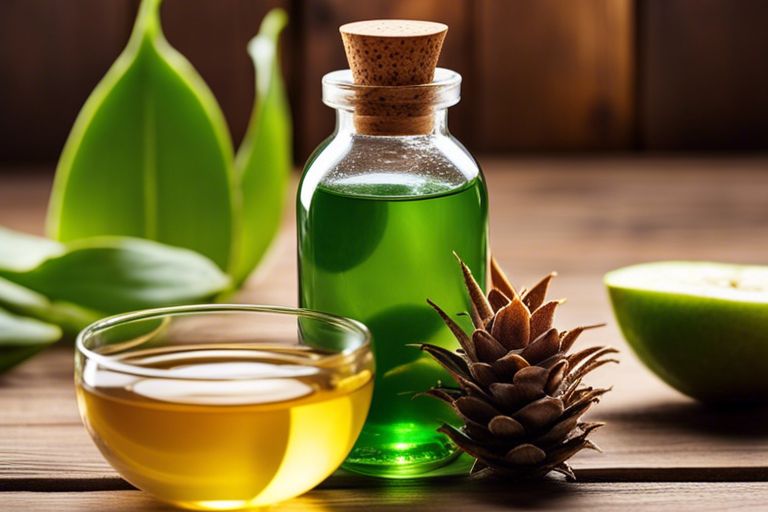Overwhelmed by flakes on your clothes or irritated scalp? You’re not alone. In this blog post, you will discover effective natural remedies that can help you tackle dandruff once and for all. Say goodbye to itchiness and embarrassment, and hello to a healthier, flake-free scalp. Let’s investigate what really works to banish dandruff for good!
The Science Behind Dandruff
What causes dandruff?
To understand dandruff, you must first know that it is a common scalp condition triggered by various factors. Any imbalance in the natural shedding of dead skin cells from your scalp can lead to dandruff. This imbalance can be caused by several factors, such as seborrheic dermatitis (a more severe form of dandruff), dry skin, sensitivity to hair care products, or an overgrowth of a yeast-like fungus called Malassezia.
The role of fungal infections and scalp irritation
For some people, dandruff is primarily driven by fungal infections and scalp irritation. Fungal infections, specifically caused by the yeast-like fungus Malassezia, can lead to increased shedding of skin cells and inflammation on the scalp, resulting in the characteristic flakes associated with dandruff. Scalp irritation from harsh hair products, improper hair care routines, or environmental factors can also exacerbate dandruff symptoms.
Fungal infections can make your scalp itchy, red, and inflamed, contributing to the development of dandruff. When the fungus Malassezia grows out of control on your scalp, it can feed on the natural oils produced by your hair follicles, causing skin cells to shed more quickly. This process can result in visible flakes on your scalp and hair, leading to the classic signs of dandruff.
Herbal Remedies for Dandruff
Even with the plethora of anti-dandruff products available in the market, sometimes nature’s remedies can work wonders for your scalp. Herbal remedies have been used for centuries to help combat dandruff and nourish the scalp. Here are some effective herbal remedies you can try to tackle those pesky white flakes.
Tea tree oil: A natural antifungal agent
Agent tea tree oil is a potent natural antifungal that can help combat the yeast on your scalp that often contributes to dandruff. Its antibacterial properties can help reduce inflammation, soothe itching, and promote overall scalp health. You can easily mix a few drops of tea tree oil with your regular shampoo or carrier oil and massage it into your scalp for a refreshing and cleansing experience.
Neem oil: Reducing inflammation and itching
To harness the power of neem oil in reducing inflammation and itching on your scalp, you can mix a few drops with a carrier oil like coconut oil and apply it to your scalp. Neem oil’s antibacterial and antifungal properties help combat dandruff while its soothing effects provide relief from the itching and inflammation often associated with this condition. Regular use of neem oil can help maintain a healthy scalp environment and reduce the occurrence of dandruff.
Coconut oil: Moisturizing and soothing the scalp
Neem coconut oil is well-known for its moisturizing properties, making it an excellent option for soothing and nourishing a dry scalp prone to dandruff. By massaging coconut oil into your scalp, you can help moisturize and strengthen your hair follicles, promoting healthier hair growth and reducing the appearance of flakes. Coconut oil also has antimicrobial properties that can help keep your scalp free from infections that may exacerbate dandruff. Incorporating coconut oil into your hair care routine can help you achieve a flake-free and nourished scalp.
Essential Oils for Dandruff Relief
Not all important oils are created equal when it comes to treating dandruff. Some oils have specific properties that can help alleviate the symptoms of this scalp condition. Here are a few important oils that have been found to be particularly effective in combatting dandruff.
Lavender oil: Calming the scalp and reducing stress
One important oil that can help soothe your scalp and reduce dandruff is lavender oil. Lavender oil has calming properties that can help alleviate itchiness and irritation on the scalp. Additionally, its stress-reducing effects can help minimize dandruff flare-ups caused by emotional tension.
Rosemary oil: Improving circulation and reducing flaking
On top of its pleasant herbal scent, rosemary oil is known for its ability to improve circulation to the scalp. This increased blood flow can help nourish the hair follicles and reduce flaking associated with dandruff. Additionally, rosemary oil has antimicrobial properties that can help keep the scalp healthy and free from fungal infections that may contribute to dandruff.
When used regularly, rosemary oil can help strengthen the hair and prevent further flaking, making it a great natural remedy for dandruff.
Eucalyptus oil: Decongesting and refreshing the scalp
Eucalyptus oil is another important oil that can provide relief from dandruff. Its decongesting properties can help clear blocked pores and promote a healthy scalp environment. Additionally, the refreshing scent of eucalyptus oil can help invigorate your scalp and reduce itchiness associated with dandruff.
When using eucalyptus oil for dandruff relief, be sure to dilute it properly with a carrier oil to avoid skin irritation. Incorporating this oil into your hair care routine can help you maintain a healthy scalp and reduce dandruff symptoms.
Dietary Changes for a Healthy Scalp
Many factors can contribute to dandruff, including an imbalanced diet. Making dietary changes can help promote a healthy scalp and reduce the occurrence of flakes and itchiness. Consuming specific nutrients can play a crucial role in maintaining scalp health.
Omega-3 rich foods: Reducing inflammation from the inside out
Omega-3 fatty acids are crucial for reducing inflammation in the body, including the scalp. Incorporating foods rich in omega-3, such as fatty fish like salmon, flaxseeds, and walnuts, can help calm inflammation in the skin, including the scalp. By reducing inflammation internally, you can see improvements in the health of your scalp, leading to reduced dandruff and itchiness.
Zinc-rich foods: Supporting immune function and skin health
Inflammation can play a significant role in the development of dandruff, and zinc is a mineral known for its immune-boosting properties and support for overall skin health. Foods high in zinc, such as pumpkin seeds, chickpeas, and cashews, can help support your immune system and promote healthy skin. By incorporating these zinc-rich foods into your diet, you can help maintain a balanced scalp and reduce the likelihood of dandruff flare-ups.
When your immune system is functioning optimally, it can better combat the yeast on your scalp that contributes to dandruff. By including zinc-rich foods like oysters, beef, and lentils in your diet, you can help strengthen your immune response and support the health of your scalp.
Probiotics: Maintaining a balanced gut microbiome
Zinc-rich foods can improve the health of your gut microbiome, which plays a crucial role in overall health, including scalp health. Including probiotic-rich foods like yogurt, kefir, and sauerkraut in your diet can help maintain a balanced gut microbiome. A healthy gut can lead to a healthy scalp, as imbalances in gut bacteria have been linked to skin conditions like dandruff. By incorporating probiotics into your diet, you can support a diverse and balanced gut microbiome, which may help reduce dandruff and promote scalp health.
Home Remedies for Dandruff
Once again, if you’re looking for natural solutions to combat dandruff, your kitchen might have just what you need. Home remedies can be effective in managing dandruff without the harsh chemicals found in some commercial products.
Apple cider vinegar: Balancing the scalp’s pH
Balancing your scalp’s pH can help reduce the growth of dandruff-causing yeast. Apple cider vinegar is a popular household item that can assist in restoring your scalp’s natural acidity. It has antimicrobial properties that can also help soothe inflammation and itching.
Baking soda: Absorbing excess oil and reducing flaking
One of the reasons for dandruff is the excess oil production on your scalp, which can lead to flaking. Baking soda acts as a gentle exfoliant that can absorb excess oil and help reduce flakes. It also has antifungal properties that can help in controlling the growth of dandruff-causing fungi.
Absorbing excess oil and reducing flaking are key in managing dandruff. Baking soda can be mixed with water to create a paste that you can massage into your scalp before shampooing. Make sure to rinse thoroughly to avoid any residue.
Banana and honey mask: Nourishing and moisturizing the scalp
Remedies like a banana and honey mask can be a luxurious way to nourish and moisturize your scalp. Bananas are rich in potassium, which can help improve the health of your scalp, while honey has moisturizing and antibacterial properties that can assist in calming scalp irritation.
If you have excess dryness along with dandruff, a banana and honey mask can be a holistic solution. Mash a ripe banana with honey and apply it to your scalp, leaving it on for about 20 minutes before rinsing off. Repeat this treatment regularly to see improvements in your scalp health.
Lifestyle Changes for Dandruff Prevention
Reducing stress through meditation and yoga
Now, one lifestyle change that can significantly help in preventing dandruff is reducing stress through meditation and yoga. Stress can weaken your immune system and disrupt the balance of your scalp, leading to dandruff. By incorporating mindfulness practices like meditation and gentle exercises like yoga into your daily routine, you can reduce stress levels and promote overall well-being.
Improving sleep quality for overall health
Prevention: Now, another important lifestyle change for preventing dandruff is improving sleep quality. Adequate sleep is crucial for the body to repair and regenerate cells, including those on your scalp. When you don’t get enough sleep, it can weaken your immune system and lead to inflammation, both of which can contribute to dandruff.
Improving your sleep hygiene by maintaining a consistent bedtime routine, creating a comfortable sleep environment, and avoiding stimulants before bed can help improve the quality of your sleep and reduce the likelihood of dandruff.
Regular exercise for detoxification and circulation
To incorporate regular exercise into your routine can aid in detoxification and improve circulation throughout your body, including your scalp. Exercise helps to increase blood flow to the skin, which can promote the removal of toxins and nourish hair follicles. Additionally, sweating during exercise can help to unclog pores and prevent dandruff-causing bacteria from thriving on your scalp.
For instance, activities like cardio, yoga, or even a brisk walk can help in detoxifying your body and maintaining a healthy scalp. Aim for at least 30 minutes of exercise most days of the week to reap the benefits for your hair and overall health.
To wrap up
Hence, when dealing with dandruff, it’s imperative to explore natural remedies as they can be effective in combating this common scalp condition. Incorporating ingredients such as tea tree oil, aloe vera, and apple cider vinegar into your hair care routine can help reduce dandruff and soothe the scalp. Remember to be consistent with your use of these natural remedies to see the best results over time.
By understanding the root causes of dandruff and utilizing these natural remedies, you can achieve a healthier scalp and hair. Experiment with different remedies to find what works best for you, and don’t hesitate to consult with a dermatologist if your dandruff persists despite trying various treatments. With patience and dedication, you can successfully manage dandruff and enjoy a flake-free scalp once again.




